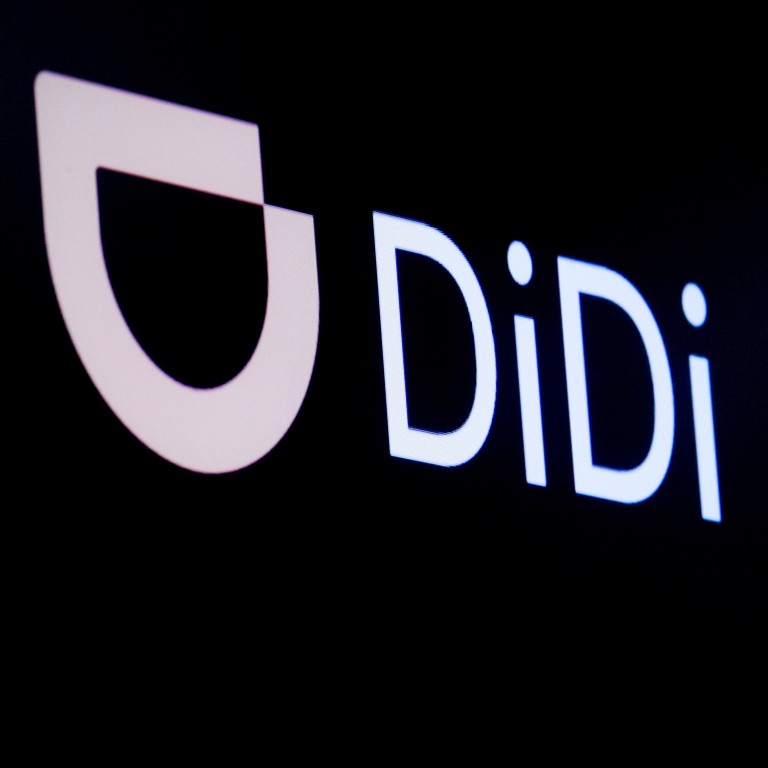
New rules on overseas listings may jeopardise future US deals for Chinese firms
- Chinese companies’ shares fall on US exchanges after Beijing announces new requirements and a national security review of Didi
- Tech and biotech firms have seen US capital markets as the top destination for their fundraising
The State Council’s rules – which followed news that Beijing has put newly listed Didi Chuxing under national security review – not only helped wipe as much as US$16.4 billion in value off the ride-hailing and tech giant on Tuesday, its fourth day of trading on the New York Stock Exchange, but threaten plans by companies such as medical services provider LinkDoc Technology, which aims to raise US$243 million from US investors.
After pulling Didi from Chinese app stores, China’s Cybersecurity Administration, citing national security, said on Monday that it was also investigating online recruiter Zhipin.com and truck-hailing app Full Truck Alliance after their listings on the US stock market last month.
Zhipin lost 16 per cent in value on Tuesday in New York trading, and Full Truck Alliance was down 7 per cent.
China’s cybersecurity watchdog orders Didi removed from country’s app stores
Overall, iShares MSCI China ETF, which tracks a basket of Chinese stocks, has traded down 4.2 per cent since Friday, when the investigation against Didi was announced.
Gabriel Wildau, a China analyst for the global advisory firm Teneo, said that the new rules “may make foreign listings more difficult” and that Chinese regulators “have been looking for ways to make Chinese capital markets more attractive for national champion tech companies, even since Alibaba listed in New York”,
But, he said, “I doubt that China’s regulators intend to shut them down entirely.”
China’s e-commerce giant Alibaba Group, for example, has lost about US$195 billion, or a third, of its value since the cancellation of the Ant Group IPO. Alibaba owns the South China Morning Post.

China’s government said it tightened the rules for initial public offerings (IPO), introducing a sweeping overhaul to how the nation’s companies can raise capital onshore and overseas, in a move that may stymie some of the biggest deals in the world’s financial markets.
“With cybersecurity being the latest source of ire, we do not know where this will end,” said Paul Krake, founder of View from the Peak, a consultancy focused on US-China investments. “It is tough to own these companies until we get some sign that the regulatory pressure is troughing.
“This is less about price or degree of underperformance and more about a sign by the regulators that they are satisfied.”
The move could derail the steady flow by Chinese tech and biotech firms that continue to see the US capital market as the top destination for their fundraising.
A New York Stock Exchange representative did not respond when asked how China’s new rules might affect US markets and future listings.
As many as 36 Chinese companies raised a total of US$12.59 billion in US markets in the first half of this year, the highest amount on record, according to Dealogic.
Why did Didi choose the US over Hong Kong for its IPO?
US investors poured billions into Didi’s IPO, leading to the company to increase its offering by 10 per cent to raise US$4.4 billion last week.
“With the signals being sent from these investigations, any Chinese firm considering a US listing will be seriously rethinking the risk,” said Martin Chorzempa, a senior fellow at Washington-based think tank Peterson Institute for International Economics.
“The US government was pushing Chinese firms to delist, especially if they had any ties to the military or some sort of strategic element that might make them think that gaining money from American investors is contributing to some sort of detriment to US national security,” he said.
Overseas listings of China’s biggest tech firms “means that Chinese retail investors can’t get a share of the companies that run the services they use”, he added. “That’s been a sticking point”.
China’s regulators tighten rules for global IPOs, stymies fundraising
Since last year when the US stepped up its efforts to remove Chinese companies from US exchanges for either the lack of audit compliance or on national security grounds, a number of large Chinese companies have sought to list their shares in both the US and in Hong Kong. Alibaba, JD.com and NetEase have all pursued dual listings since.
Despite the last-minute collapse of the Ant IPO and the sudden national security review for Didi, Chinese regulators have made some moves to make domestic listings more attractive.

For example, Chorzempa noted that the time frame for Chinese regulators’ approval for a domestic IPO has shrunk to as little as six months, compared with “multiple years” previously, while authorities no longer insist on a track record of profitability before listing, which is not necessarily a requirement for a Nasdaq listing.
China’s regulators are also trying to push more of the due diligence function needed to ensure that fraudulent companies do not make it onto a domestic exchange as well as underwriters “to remove the bottlenecks”, he said.
Teneo’s Wildau said China has pledged to make IPO approvals easier on the main boards in Shanghai and Shenzhen, “but full deregulation, if it ever happens, is still years away.”
“As long as Chinese listings remain difficult, companies will continue to seek foreign listings,” he said.


